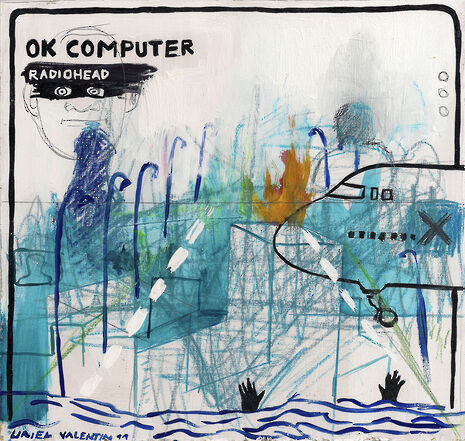‘OK Computer’ is twenty years young
Lydia Sabatini finds that Radiohead’s third album is still groundbreaking twenty years after its initial release

When it comes to music, Radiohead’s 1997 OK Computer was my gateway drug, and, as with drugs, the first experience is not always the best one. Circa 2010: I had got hold of an old, rented copy of the CD, and eagerly inserted it into my parents’ thick desktop computer. Instead of the transcendent work of genius I had measuredly been expected… it sounded slightly strange. Each track sounded like a radio does if you keep quickly twisting the volume switch back and forth. It was wincingly ugly. Now, I had been forewarned by the Internet that the sound may take a couple of listens to get used to. I genuinely had no idea whether the CD was broken, or if this purported masterpiece was just of such celestial coolness that I, a deeply uncool teenager, would never ‘get’ it. Maybe I was best off slinking back to 'Creep' with my tail between my legs, because I didn’t belong here.
Of course, when I eventually had the initiative to seek external corroboration, I realised it was indeed the CD, and not my musical taste buds, that was faulty. Hearing the unadulterated flow of strange sounds felt like small technological miracle, and I duly downloaded the album onto my iPod. Paradoxically, although I look back on my first experience of this album almost nostalgically as a technologically- and emotionally-simpler time, it was this album that introduced me to mature, complex soundscapes, leaving behind the pop-rock and ‘emo’ material of my adolescence.
The lyrics of the album, evocative yet deeply political, were coinciding with my own political awakening. Eventually, I went on to prefer their 2007 effort In Rainbows, probably because it is more wistful and beautiful; music you can get lost in. But OK Computer compels with a dark, hysterical urgency that never lets the listener drift. The dark lyrics and melodies will not relinquish their fierce hold over the listener. The dystopia you fear, it whispers then screams, you are living in already.
OK Computer compels with a dark, hysterical urgency that never lets the listener drift
Perhaps all masterpieces are made with hindsight. In 1997, OK Computer received critical acclaim worldwide, gaining the band a UK Number One Album and, later, a Grammy. Yet, the contemporary reviews do not suggest that it was this album in particular that was going to remembered 20 years down the line. Undoubtedly the audacity was appreciated. In a 4-star review, Rolling Stone applauds them for releasing a concept album “at a time when they could have played it safe”. It was No. 2 on NME’s Album of the Year List, pipped to the top spot by Ladies and Gentlemen We Are Floating in Space by Spiritualized. (Nope, me neither.)
Radiohead was likely to share the indie-rock airwaves as part of a musical ecosystem that included artists such as Oasis, The Verve and Bjork. They had so far released two enjoyable and successful but far less adventurous albums, Pablo Honey (1993) and The Bends (1995). Far from being considered the experimental-alien-techno- godfathers of the music industry they are today, Radiohead pre-1997 were often grouped together with Oasis, Blur and Pulp as part of the Britpop movement. No one had expected OK Computer.
And despite a spree of pallid imitators, Radiohead left each and every one of them in the dirt, only taking themselves further and further up into to the electro-musical stratosphere. As the years went on they kept moving, exploring new sounds, and never looked back to OK Computer. Yet we are still listening to it, twenty years later.
So, history and influence aside, does Thom Yorke’s mania of modernity still speak to us in 2017? The answer is a resounding yes. Indeed, like many true works of art, it is eerily prescient and ahead of its time. Thematically, it stands as an almost 21st century riposte to a decade in which many fell for the flashy optimism of the New Consumer Dream. Technophobia abounds in the album, but far from seeming Luddite, this perfectly captures the sense of isolation and inertia caused by digitisation and the new speed of life that are very much talking points today.
“Fitter, happier, more productive” slots right into an era full of online advice and self-help guides telling us how to maximise our life so we can work more. God knows how many times I have heard the word ‘productivity’ used at this university as if it is the ultimate goal for us all.
The sense of deeply cynical political suspicion showcased so bombastically in 'Electioneering' fits our present political climate disconcertingly well. Essentially, what makes the album accessible today, is the overall atmosphere of fear, paranoia, powerlessness, and the profound wish that it would all, please, just “Slow down… slow down”
 News / Report suggests Cambridge the hardest place to get a first in the country23 January 2026
News / Report suggests Cambridge the hardest place to get a first in the country23 January 2026 News / Reform candidate retracts claim of being Cambridge alum 26 January 2026
News / Reform candidate retracts claim of being Cambridge alum 26 January 2026 News / Cambridge ranks in the top ten for every subject area in 202623 January 2026
News / Cambridge ranks in the top ten for every subject area in 202623 January 2026 Comment / Cambridge has already become complacent on class23 January 2026
Comment / Cambridge has already become complacent on class23 January 2026 News / Students condemn ‘insidious’ Israel trip23 January 2026
News / Students condemn ‘insidious’ Israel trip23 January 2026








